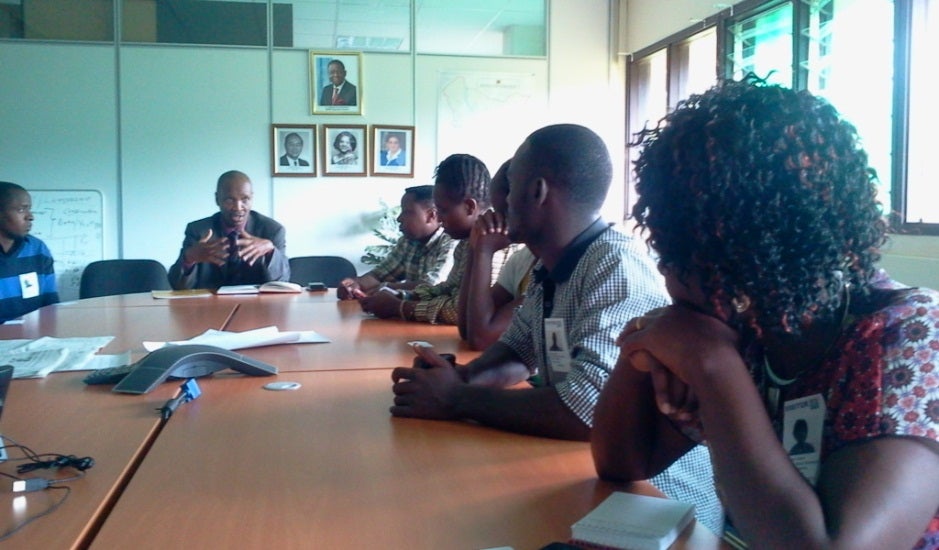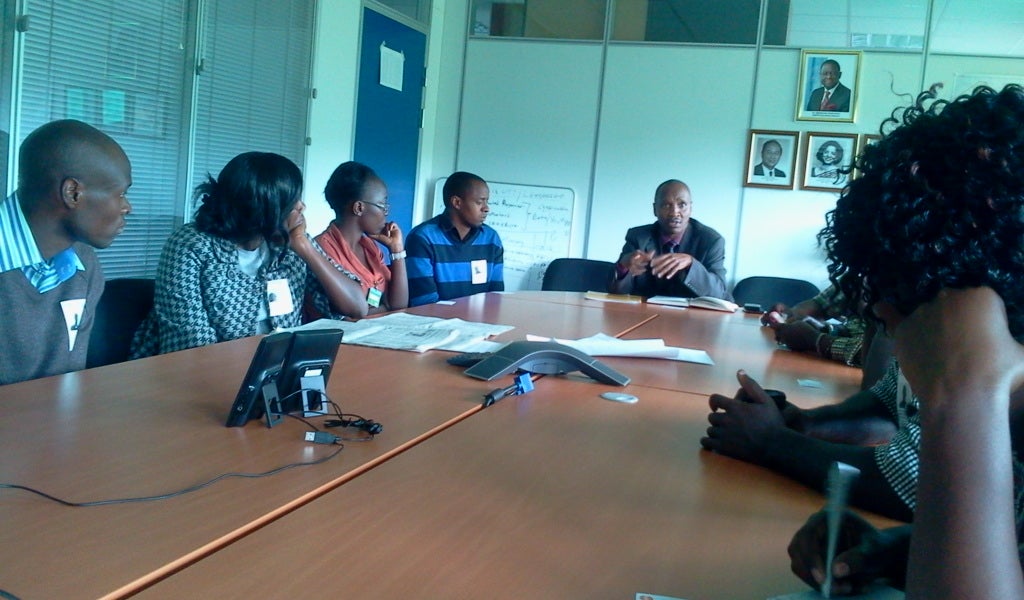UNFPA Assistant Representative (RH) Dr. Stephen Wanyee addressed top Kenyan journalists before they proceeded to Mumias and Eldoret to report on the extent of obstetric fistula in Kenya. The exercise was conducted as part of the activities leading to the launch of the inaugural International Day to End Obstetric Fistula set for May 23
In order for the campaign to end obstetric fistula in Kenya to gain national importance, the media must include it in its main agenda. Only then will the Government of Kenya appreciate just how dire the situation is and aggressively intervene to save the thousands of women suffering from obstetric fistula.
This was said by Dr. Stephen Wanyee, UNFPA's Assistant Representative (RH) during a meeting with top Kenyan journalists who were about to travel to Mumias and Eldoret to cover stories and events around obstetric fistula. The journalists from KTN, NTV, KBC, K24, Daily Nation, The Standard and The People were being supported by UNFPA to go to the field to see just how severe cases of obstetric fistula were in the selected sites.

One of the most serious injuries of childbearing is obstetric fistula, a medical condition in which a fistula (hole) develops between either the rectum or vagina (recto-vagina fistula) or between the bladder and vagina (vesico-vagina fistula) after severe or failed childbirth, when adequate medical care is not available. It is considered a disease of poverty because of its tendency to occur in women in poor countries where resources are scarce.
The devastating injury (the fistula) leaves the woman incontinent and the consequences of this injury more often leaves her ashamed, ostracized and excluded.
"In Kenya, it's been found that many women and girls suffer from fistula between the ages of 14 and 35 years," revealed Dr. Wanyee. "For some it is as a result of cultural practices where girls are married off early and get pregnant before their bodies are ready to deliver babies; and from female genital mutilation where the birth canal is sealed. When these women and girls get obstetric fistula, most are excluded from daily community life and abandoned by their husbands and families. They are isolated both socially and emotionally, making it almost difficult to maintain a source of income or support, thus deepening their poverty and magnifying their suffering."
"Obstetric fistula is a condition that mainly affects the poor," Dr. Wanyee continued. "About 3,000 women in Kenya get fistula during childbearing each year, yet only about 100 receive treatment each year. So you can imagine the backlog of women in this country accumulated over decades who are suffering in silence from this painful and humiliating condition."
During the field excursion to Mumias and Eldoret - two of the areas where UNFPA has been providing technical and financial support to hospitals to treat obstetric fistula - the journalists would get the opportunity to interact directly with the victims and survivors of obstetric fistula. The journalists would also meet the surgeons who conduct repairs to obstetric fistula patients. The surgeons form the minority of specialists in the area as not many doctors in Kenya - and in the world - have been trained in this area.

Reiterating the fact that most victims of obstetric fistula were usually poor, illiterate women who have limited access to health services, including maternal and reproductive health, Dr. Wanyee added: "Keeping girls in school for longer periods will save many of them from childbearing at an early age, and this will also help in negating the occurrence of obstetric fistula in this country. We are hoping that when you go into the field, you can help raise the social consciousness of Kenyans and of the government and increase interventions into this area. As it is now, county governments have allocated a minimal budget to health, and this will negatively affect maternal health, especially in areas where obstetric fistula is common."
Obstetric fistula has been virtually eliminated in industrialized nations, but the situation is different in the developing world including Kenya. However, obstetric fistula is preventable and, in most cases, can be surgically repaired.
"The surgery to repair obstetric fistula costs about Kshs. 30,000 (USD 353) per person. Many women cannot afford this so they remain with the condition and suffer in silence. We commend President Uhuru Kenyatta for declaring maternal health free as we believe this will go a long way to ensuring more women and girls with obstetric fistula receive repair and treatment for the condition, but we know that a lot of work has to be done for this to be realized," Dr. Wanyee said.
The journalists on their part expressed enthusiasm over the assignment and expressed their eagerness to proceed to Mumias and Eldoret to unearth a condition that not many people are aware of or are ashamed to talk about.
"Our role as journalists is to inform and educate the public on issues that affect us as Kenyans. We will therefore do our part as journalists. We will also provide a critical analysis of the condition and the interventions being made on the ground to alleviate this problem," said Caleb Karuga, a senior reporter with K24.
To date, the facilities available to treat fistula and which are supported by UNFPA include:
-
Kenyatta national Hospital, Nairobi
-
Jamaa Hospital, Nairobi
-
Moi Referral and Teaching Hospital, Eldoret
-
Nyanza Provincial and General Hospital, Kisumu
-
Machakos General Hospital, Machakos
-
Coast Provincial and General Hospital, Mombasa
-
Garissa Provincial and General Hospital, Garissa
-
Kakamega Provincial and General Hospital, Kakamega
-
Central Provincial and General Hospital, Nyeri
-
Outreach services, Kapenguria and North Eastern

